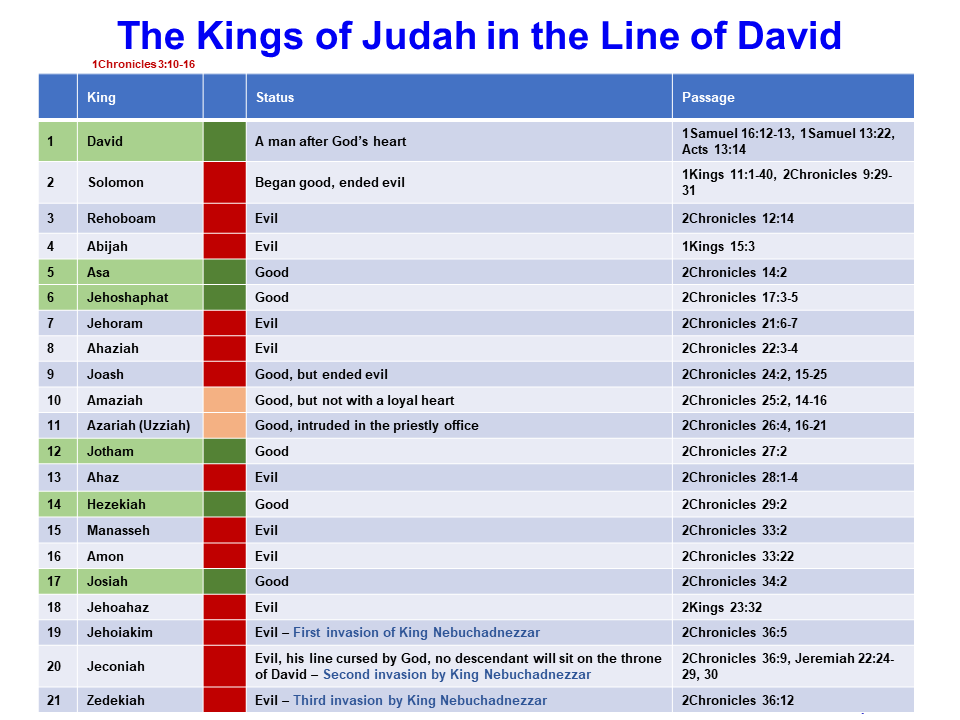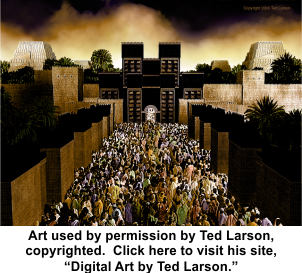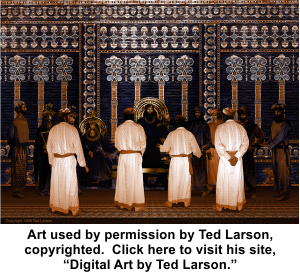Daniel: Chapter 1
Setting
The book of Daniel was written by one of the greatest heroes in the bible. by the inspiration of God, 2Timothy 3:16, Daniel describes the work of God through men’s activities on this earth, both with Israel and the Gentile governments. Much is written in this book of the first and second advents of Christ Jesus, and His work in the world to bring salvation to all mankind.
Daniel was a teenager when he was taken captive away from his land, because he was of noble birth. Yet, he had been raised well in his formative years in the ways of the Lord, and he purposed in his heart to follow God. Daniel’s commitment and faith in God was demonstrated repeatedly throughout this book.  Its twelve chapters provide both a historical account of those exiled from their land of Judea and Jerusalem into Babylon, and prophetic passages concerning rule of the Gentiles and Israel's future. The time-frame extends from the days of Daniel's youth to the rejection and crucifixion of Christ, then on to the millennial reign of Christ Jesus. The detail in its prophetic passages serves as a bridge to the book of Revelation. It begins with Israel’s captivity under the rule of the Gentiles, until the end of the tribulation period, at which time Christ will return and establish His reign over the world from His temple in Israel, Psalm 2:6-12. He will be King of kings and Lord of lords over the whole world. Jesus will then sit on the throne of David to rule with a rod of iron, and thus fulfill all of the remaining prophecies and promises to the nation of Israel that can only be accomplished by His return.
Its twelve chapters provide both a historical account of those exiled from their land of Judea and Jerusalem into Babylon, and prophetic passages concerning rule of the Gentiles and Israel's future. The time-frame extends from the days of Daniel's youth to the rejection and crucifixion of Christ, then on to the millennial reign of Christ Jesus. The detail in its prophetic passages serves as a bridge to the book of Revelation. It begins with Israel’s captivity under the rule of the Gentiles, until the end of the tribulation period, at which time Christ will return and establish His reign over the world from His temple in Israel, Psalm 2:6-12. He will be King of kings and Lord of lords over the whole world. Jesus will then sit on the throne of David to rule with a rod of iron, and thus fulfill all of the remaining prophecies and promises to the nation of Israel that can only be accomplished by His return.
Historical perspective
Daniel is a historical figure, and a contemporary of the prophets Ezekiel and Jeremiah. The book of Daniel does not appear among the prophets in the Jewish Bible, but is included among the Jewish writings. Nevertheless, Jesus declared Daniel to be a prophet, Mark 13:14. Daniel was taken captive in the first invasion of King Nebuchadnezzar, and was a great witness of God to the king's court. Ezekiel was taken in the second invasion, and was God's man to the general population of the captives taken back to Babylon. Jeremiah was God's witness against those who survived the third and final invasion of King Nebuchadnezzar of the land of Judah and Jerusalem. Given the choice to go to Babylon or remain in Judea, Jeremiah remained with the poor and weak who were left to tend the land, Jeremiah 40:1-13. The following chart is a summary of the three Babylonian invasions.
| Event | approximate Date | Notes |
|---|---|---|
| 1st invasion by Babylon | 605 B.C. | Daniel taken into captivity
King Jehoiakim deposed 2Chronicles 36:5-6 |
| 2nd invasion by Babylon | 597 B.C. | Ezekiel taken into captivity
King Jehoiachin deposed 2Chronicles 36:9-10 |
| 3rd invasion by Babylon | 586 B.C. | Jerusalem destroyed,
2Chronicles 36:14-21
Jeremiah left in Judah, Jeremiah 40:1-6 King Zedekiah deposed 2Chronicles 36:11-18 |
Jesus and Ezekiel referenced Daniel in positive ways. First, Daniel was associated with other great men of faith in the scripture, namely Job and Noah, Ezekiel 14:12-20. Second, Daniel's wisdom was referenced in one of the words of judgment of the Lord spoken through Ezekiel, where the prince of Tyre's wisdom was compared with that of Daniel's. Here, Daniel's wisdom served as a benchmark that others were measured against, Ezekiel 28:1-3. Finally, the Lord referenced Daniel as a prophet during His Olivet Discourse, Mathew 24:15.
A high-level view of Israel's history leading up to King Nebuchadnezzar's invasions
The nation of Israel was given privilege not given to any other nation ever existing in the world. The Lord called them out of Egypt over three thousand years ago, and gave them His laws, His word, and through them came the promise of the Messiah, Deuteronomy 4:4-8, Romans 3:1-3. However, their faithfulness to all that was given to them ebbed and flowed over their history, yet the Lord was faithful to His word and to all His promises. Their rebellion against God and His ways resulted in Israel and Judea being removed from the land promised first to Abraham, Genesis 15:18-21, then reconfirmed to Isaac, Genesis 26:2-5, and then Jacob, Genesis 28:12-15. However, for their rebellion against the Lord, He twice removed them from their land. The second time, God dispersed them throughout the world after Rome destroyed Judea, Jerusalem, and the temple. Yet, the Lord said through Ezekiel that He would bring them back from out of all the countries of the world for His own name's sake, and they will have a renewed relationship with the Lord, Ezekiel 36:16-25.
Beginning with Abraham, Isaac, and Jacob, the children of Israel were strangers and sojourners in their land that the Lord gave them, Genesis 23:4, because the land is the Lord’s, Leviticus 25:23-24. This special relationship with the Lord, came responsibilities. Prior to entering the land God promised them, and to take possession of it, the nation received awesome responsibilities of being a people of the Lord, Deuteronomy 27:9-10. They were given blessings and curses based on their actions, Deuteronomy 28:1-2, Deuteronomy 28:58-59, Deuteronomy 28:63-64. As a nation, King David brought them into great prominence, influence, and wealth because he was led by the Lord. His son, King Solomon brought the nation to the pinnacle in the belief and worship of God early in his reign, most notably at the dedication of the temple of the Lord, 2Chronicles 7:1-4. The Lord had given great promises to King Solomon, and chose Jerusalem as the place where He would hear the prayers of His people. He would attend to that place and His eyes and ears would be there perpetually, 2Chronicles 7:12-18. Unfortunately, the slide away from the Lord also occurred at the end of the King Solomon's reign, 1Kings 11. The ultimate result of the growing unbelief in the nation of Israel, was that it was divided into the northern tribes and southern tribes. Over time, as a result of their open rebellion against the Lord, the northern tribes become captive to the Assyrians, 2Kings 18:11-12. Much later, King Hezekiah of the southern tribes, was warned by the Prophet Isaiah that Judah would be taken captive by the Babylonians, 2Kings 20:16-18. The rebellion of the southern tribes against the Lord and His ways had digressed to such a degree, that despite the good King Josiah’s reign, God’s judgment would still occur, 2Kings 23:24-26, Psalm 137:1-7. This is what led to the first of two occasions that Israel was exiled from the land. The first conquest of King Nebuchadnezzar and taking King Jehoiakim captive is shown in the table above, 2Chronicles 36:5-7. The second exile of Israel occurred centuries later, when Titus destroyed Jerusalem in 70 A.D. and the Jews suffered a worldwide dispersion.
The following table illustrates the undulation in Judaen faithfulness. on the whole, the kingdom of Judah was mostly ruled by kings who did not follow the way of the Lord.

The Book of Daniel
The book of Daniel can be segregated in a few ways for better comprehension of God’s work in the history of Israel and of the Gentile nations. Daniel chapter one through chapter six can be viewed as a historical chronology of Israel’s years of captivity. However, the latter chapters, seven through twelve, are prophetic and restart the historical chronology of when the visions and dreams were given to Daniel, beginning in the first year of King Belshazzar. The events revealed to Daniel in visions, dreams, and the discourse with the angel Gabriel, are not given in a sequential prophetic timeline from chapter seven through twelve. For example, the events revealed in chapter seven occur after the events in chapter eight. Chapter nine then covers the entire spectrum of time from King Nebuchadnezzar’s destruction of Jerusalem through today, and on through to the seven years of tribulation, and to the beginning of the 1,000 year reign of Christ. Finally, chapters 10 through 12, which are all based on the same vision, recount the prophetic events in chapters seven through nine in more detail, and in sequential order.
Another means to further understand the book of Daniel is to know what parts of the book were written either in Hebrew, the Jewish language, or in Aramaic, the Gentile language. One important inference to make in the change of the written language in Daniel’s book, is to know whom that section was written about or to which group, to either the Jews or Gentiles. The beginning of the book is written in the Hebrew language, then cnanges to Aramaic, then resumes back to the Hebrew language.
Daniel held a supreme position in King Nebuchadnezzar’s court. God gave him knowledge, skill in all learning, and wisdom to excel in that position. It is therefore, not surprising that Daniel would have been fluent in many languages. Perhaps the more subtle meaning ascribed to this change in language is to imply that God is speaking to both the nation of Israel and to the Gentile nations. For it is with the destruction of Jerusalem that we see a temporary end, but not the elimination, of the royal reign of Judah. From that time to the present, the world has witnessed a series of Gentile nations ruling over the nation of Israel or the affairs of Israel. However, upon the return of the Lord to this world to establish His earthly kingdom, the royal line of Judah will resume through the Lord Jesus Christ, Revelation 19:11-21 and Revelation 20:1-6. Clearly, the association of Hebrew text to verses one in the first chapter in Daniel, through the first half of verse four in chapter two concern the captives. These verses are directly related to Daniel and his friends, and their faithfulness to God’s words despite the dire consequences they faced. The remainder of the verses in chapter two are God’s revelation to the Gentile nations so they would know of God’s sovereignty over all their activities until the end of their rule and influence over Israel. The resumption back to the Hebrew text is found in chapter eight, verse 1, through the remainder of the book, which reflects God speaking solely to the nation of Israel. It is during the rule of the Medes and the Persians, that Israel was allowed to return to their own land to rebuild the temple, and eventually rebuild the wall of Jerusalem. It is the rebuilding of the wall that began the 70-week clock found in chapter nine of Daniel. The breakdown of the verses is as follows:
Aramaic was also used in these Old Testament passages: Ezra 4:8-6:18, Ezra 7:12-26, Isaiah 36:11, Jeremiah 10:11. However, unlike the verses cited in the table above, these captured the language used in correspondence or in a dialog, and have no meaning than within the context the verses are contained in.
The following table provides further insight on the book of Daniel concerning its two great divisions; first, concerning Daniel and his three fellow exiles in a historical sense (Daniel chapters 1-6), second, the prophesies revealed and interpreted to Daniel, (Daniel chapters 7-12). The following is a variation of that written by Bob Deffinbaugh, Daniel: Relating Prophecy to Piety, Daring to Believe Daniel, whose article can be found at bible.org. The difference with the following table by a layman, besides the extra content, is whether the prophetic passages presented in Daniel chapters 7-12 are chronological or not. It is viewed in this site that they are not, as will be shown in pages on this site concerning Daniel 7:1-28, Daniel chapter 7.
| A Historical and Chronological View of Daniel | Daniel chapters 1-6 | Daniel chapters 7-12 |
|---|---|
| Describes Daniel's life with his fellow exiles | Present future prophetic events that stretch across millennia |
| Provides a biographical and historical sketch of Daniel and his fellow exiles | These chapters are all prophetic concerning the nation of Israel and of the Gentile nations that rule or influence Israel, its land, and Jerusalem |
| Present the events in these chapters chronologically | The prophetic passages are not presented chronologically |
| Are written in the 3rd person | Are written in the 1st person |
| Others have dreams or visions | Daniel writes down his dreams and visions |
| Daniel is used by the Lord to interpret the dreams or visions of others | Others interpret the dreams and visions of Daniel |
A comparison of Daniel with Joseph, the son of Jacob
Before delving into Daniel 1:1-21, it is instructive to compare how the Lord preserved both Daniel and Joseph in their captivity, and the similar ways the Lord used them to bring salvation to Israel. Joseph was used to preserve Israel through a terrible famine, then to have Israel grow to become a nation in Egypt, Genesis 15:13-16. Daniel was used to reveal God's prophetic plan for Israel in detail.
There are several points of likeness between Joseph and Daniel. Primary among their similarities, is the desperate situation both faced as young boys/men. They remained faithful in face of tremendous pressure to assimilate into the culture that they were violently thrust into. Both demonstrated from their birth the strong inculcation of God's ways that were revealed to Israel. So when they were separated from any family support to help keep them in their faith in the one and true God of Israel, they remained faithful to God, Proverbs 22:6. Most importantly is that the Lord was faithful to both and sustained them and kept them while in captivity. Both faced many dangers and threats, yet the Lord had a purpose for their lives, and the Lord demonstrated His sovereignty over man's activities. Both began their early years in enslavement, but because the Lord was with them, they rose all the way up to positions of great responsibility, next to the Pharaoh or King Nebuchadnezzar and King Cyrus. They were diligent to always present themselves to be approved of God, 2Timothy 2:15.

In Daniel 1:1-2, the record of the time is given to set the stage for the introduction of Daniel, a teenager taken captive by King Nebuchadnezzar, the king of Babylon. The map seen to the right, illustrates the general path and distance that the captives traveled as they were displaced from their land to Babylon. The length of time of such a trip is recorded by Ezra when he and those with him returned to Jerusalem following their captivity under the rule of the Babylonians. It took them five months to complete the journey Ezra 7:8-9. The first conquest of King Nebuchadnezzar against Jerusalem occurred during the reign of Jehoiakim, king of Judah, Jeremiah 25:1. King Nebuchadnezzar's successful campaign against Judah was not due to his skill as a warrior and leader, but it was the Lord who delivered King Jehoiakim into Babylonian hands, Daniel 1:2. Further, it was the Lord who allowed part of the vessels of the house of God to be carried away by King Nebuchadnezzar. The Lord's vessels were stored in Nebuchadnezzar's treasure house of his gods. These vessels were safely held as prophesied by Jeremiah, Jeremiah 27:16-22, and returned to Israel on Ezra's return to Jerusalem, Ezra 1:5-10. They were kept safe and protected until the 70 years of judgment were fulfilled which the Lord had determined against Israel and measured by the desolations of Jerusalem, Daniel 9:1-2. Upon the decree of Cyrus, king of Persia at the fulfillment of the 70 years of Israel's exile, the king sent out his proclamation throughout all his kingdom that the Lord God had given him a commandment to build the Lord a house at Jerusalem, Ezra 1:1-4. All those of Israel who left to return to their land, returned with the all of the articles of the house of the Lord which Nebuchadnezzar had taken from Jerusalem and put in the temple of his gods, Ezra 1:5-11.

While living in captivity under the Babylonians, the Lord instructed the Jews to pray for their captors and live peaceably in Babylon, Jeremiah 29:4-11. They were not to rebel, fight for freedom, and escape their exile, but were to regard the word of the Lord that was sent by letter from Jeremiah the prophet. In this letter, the exiles were also warned to be aware of the same false prophets and diviners who led them astray in Jerusalem; to not be deceived by them in exile. These false prophets spoke falsely in the name of the Lord. The Lord also expressed His thoughts toward Israel, which are of peace, and to reaffirm the expected end of their exile in 70 years, Jeremiah 29:10-11. However, those in exile were not to pray for those who remained behind, Jeremiah 7:15-20.
During their exile, the land would be desolate, Leviticus 26:27-36. In both dispersions, during the Babylonian exile and their worldwide exile from the land by Rome conquering and destroying Israel, the land was in desolation as long as Israel was not in the land. In most cases, others would have come into the land to claim it, farm, cultivate, and thrive in it. But this was not the case for Israel, for this is God's land. Evidence is but a generation away, when prior to Israel becoming a nation again shortly after World War II, the land had been desolated for nearly two millennia. During the 1860s, a firsthand account of the region was recorded by Mark Twain. He had remarked on the incredible bleakness across the whole land of Israel. There was no vegetation of regard, dry and rocky was all he and his fellow travelers could see. There were few who populated Jerusalem at that time, which was such an important city in the history of mankind. This was the place God had chosen to have His name there, 2Chronicles 6:6. However, as the Jews returned to the land that God promised them, it flourished, and now it is a major exporter of foods to Europe, and the land is green and fertile. Satellite images show the stark contrast between the land controlled by Israel and that controlled by the Palestinians.
In his eight DVD series, The Oracle Uncensored!, Jonathan Cahn shows how Mark Twain was used by God to fulfill the prophecy given by Moses, Deuteronomy 29:22-23. Jonathan Cahn illustrated how Mark Twain, who was not known as a believer in Christ Jesus, was the foreigner from a far land who would say and write in his book, "Innocence Abroad," the same words in his book that Moses wrote in Deuteronomy 29:23. Twain was used to show how after many centuries of the land being desolate, and the children of Israel being scattered throughout the world, that God was preparing the land for the Jews when they returned. Simultaneously, He was preparing the Jewish people to return to their land. Jonathan Cahn shows in his DVD series how all this began in 1867.
In Daniel 1:3-5, the record of Daniel's exile is given during his first years of his captivity. From the beginning, it is reported that Daniel was well-favored among all of the others also taken into captivity. These elite Jewish youth were taken by the Babylonians because they had no physical blemishes, educated, and possessed understanding of expected behaviors, customs, and protocol within the king's court. These youths were taken to receive special training to ultimately serve in King Nebuchadnezzar's court. They were taught the Babylonian culture, religion, and language. During this time, the young Jews were fed the king's food, which had been offered to the Babylonian gods. This was the one element of change Daniel chose to resist in the name of God, so that he could observe the Lord's dietary laws that were levied upon the children of Israel, and to insure all the glory went to God. This was probably an intense training program, by the Babylonians, which lasted for three years. Thereafter, the trainees were to appear for a most likely lengthy and grueling examination before the king.
In Daniel 1:6-7, three other fellow exiles are introduced with Daniel. All four are found in this book to be incredible, sound and stellar witnesses for God. Despite the remote and insolated conditions from that of the rest of the exiles, they joined together to serve the Lord, and remain faithful to Him, despite the very tempting and dangerous conditions they found themselves in. They resisted being completely matriculated within the Babylonian culture, which was a primary goal of the training that they received. Being the conquered, it was up to the king to rename them, just as Pharaoh did with Joseph in the years preceding the days of Moses. Daniel, Hananiah, Mishael, and Azariah were given new names in recognition of the gods the Babylonians worshiped. The following table shows the Hebrew names of these four young boys and how they were associated with the attributes of the Lord. On the right side of rtheww table are the names given them by the Babylonians and their meaning. The Babylonian names were associated with the names of the Babylonian gods, which was adopted from Blue Letter Bible.
| A Comparison of the Given and Assigned Names of the Four Hebrews | Hebrew Names | Babylonian Names |
|---|---|
| Daniel - God is my judge | Belteshazzar - lord of the straitened's treasure |
| Hananiah - God has favored | Shadrach - royal or the great scribe |
| Mishael - Who is what God is? | Meshack - guest of a king |
| Azariah - Jehovah has helped | Abednego - Servant of Nebo |
One of the reasons for Israel's judgment from God was her rebellion against Him by worshiping idols. Though the prophet Habakkuk wrote of the impending judgment, the cruelty and idolatrous behavior of those used as the Lord's instrument of judgment was never to be construed as His endorsement of their behavior, Habakkuk 1:1-17. The Babylonians were later judged by God for all their atrocities against His people Israel, and rejection of God. However, at this time, the four young Hebrew men were given names related to the Babylonian gods. These false gods may have been the very ones that some in Israel had worshiped and caused the Lord's wrath to be vented against them, 2Kings 21:10-18.
A most extraordinary event occurs in Daniel 1:8-16. Within the helpless situation the Hebrews found themselves (in a worldly sense), they chose to follow and honor the Lord, in those areas that they could control. Their experiences compare well with what Joseph faced in the days that he was in Egypt before he interpreted Pharaoh's dream. The juxtaposition of Daniel with Joseph is shown in the table above, on the comparison of Daniel with Joseph. Both Daniel and Joseph were given new names by their captors that were an acknowledgement of a false god, but both continued in their faith and belief in the Lord, and gave Him all glory in every circumstance they found themselves in.

So why did Daniel and the other three Hebrews choose to use their diet as the grounds to establish their faith with the eunuchs unto whom they were subordinated and not their names? Throughout this book, Daniel's Babylonian name is used interchangeably with his Hebrew name. Daniel 1:8 provides the answer. Daniel purposed in his heart that he would not defile himself with the meat and wine from the king's portion of his meals. Unlike the name change, which did not defile a person, it was the consumption of certain foods, particularly those used in the sacrifice and worship of false gods, that defiled a person. Daniel again stood out among the other three Jewish youths with him. Scripture shows that this was Daniel’s purpose that he shared with the other three, and then they joined with Daniel completely. The four did not collaboratively arrive at the decision, it was Daniel’s thought and his persuasion upon the others to follow this course of action.
Daniel’s approach with the eunuch who had charge over him, was exemplary. Daniel did not demand or protest the food given him, but as was already attributed to him, he acted wisely with the eunuchs by submitting a request. Daniel exercised faith in the Lord, by prudently requesting a new diet. As written in Hebrews, it is impossible to please the Lord without faith, Hebrews 11:6. Undoubtedly, there was concern on the part of the eunuchs about this request, since not only were the Hebrews to be evaluated by the king himself in three years, but the training and charge of the eunuchs were under review as well. They were very interested in the mental and physical well-being of their charges as they appeared before the king. It is no wonder that the eunuchs expressed great concern over this request. The fact that they would even entertain such an idea is evidence of how God had brought Daniel into favor and tender love with the prince of the eunuchs, Proverbs 16:7. As seen over and over again, Daniel was well prepared for these courtly situations, and in this case offered to the eunuchs a test, a scientific experiment. After 10 days of the Hebrews' eating their special diet, which was different from the king's, their countenance would be compared against the rest of the captives. Of course, the test proved that their physical appearance would not diminish but improve. Therefore, per Daniel's request, the king's portion was taken from them and a diet that complied with the Lord's commandments were given them. Behind all of this, is the Lord honoring Daniel and the other Hebrews for their faithfulness to His word, Psalm 31:21-24.

After three years passed, the time for testing the four Hebrews arrived, Daniel 1:17-20. The Lord had given all four Hebrew youths knowledge and skill in learning and wisdom. To Daniel, the Lord also gave the gift of understanding in all visions and dreams. Even in judgment, God does not forget His own, but He keeps them and blesses them. Without the Lord's blessing, none of these Hebrews would have survived or succeeded. As they appeared before King Nebuchadnezzar, the four Hebrews demonstrated that they were of greater worth than any other advisor or wise men the king had in his realm. Their abilities, knowledge and understanding were so much greater than the rest, the king consulted them in all matters of wisdom and understanding. Daniel 1:20 quantifies the Hebrew’s skill level to be a whole order of magnitude higher than all of the king's other advisors. Daniel 1:21 is a concluding verse for this introductory chapter. It shows that Daniel outlived the Babylonian kingdom, and lived to see the transition to the Medes and Persian empire.
